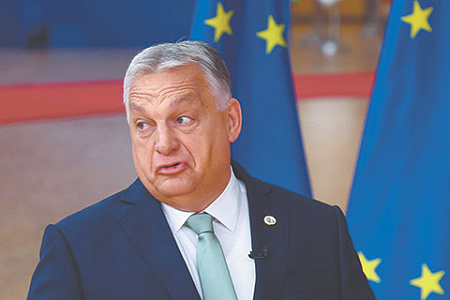
The European Union is considering a significant procedural shift that would allow it to launch membership negotiations with Ukraine by overcoming Hungary’s persistent veto. The European Commission has asserted that opening the initial phase of accession talks could be decided by a qualified majority of member states, rather than the traditional requirement of full unanimity, a move aimed directly at sidestepping Budapest’s opposition.
This potential workaround was highlighted by European Commission spokesperson Guillaume Mercier, who stated that the EU’s executive body would formally propose the start of negotiations with Kyiv. If all member states except Hungary agree, the talks could proceed. “When a country is denied European integration without objective reasons, despite meeting the necessary criteria, it undermines trust in the entire EU enlargement process,” Mercier explained, signaling a growing impatience within Brussels with Hungarian Prime Minister Viktor Orbán’s position on the Russia-Ukraine conflict.
For months, Hungary has blocked progress on Ukraine’s EU bid, citing various justifications. Until now, the principle of unanimity in the EU’s founding treaties left Brussels with few options. The new legal interpretation, however, argues that unanimity is only mandatory for the final decision to admit a new country, not for opening the negotiation chapters. This reinterpretation comes as EU Commission President Ursula von der Leyen has also advocated for broader reforms to replace unanimity with majority voting on key security and defense matters, reflecting a push for a more agile EU in a volatile world.
The showdown is set against a backdrop of deteriorating relations between Hungary and Ukraine. Tensions recently flared after Ukrainian President Volodymyr Zelensky accused Hungarian military drones of violating his country’s airspace. Orbán’s response was dismissive, questioning Ukraine’s sovereignty in a recent statement: “Ukraine is not an independent, sovereign country… we are financing it.” While EU leadership has not officially intervened in this specific dispute, Kyiv’s position enjoys substantial backing across the bloc.
This broad front of support for Ukraine was on full display at the recent Warsaw Security Forum. Polish Prime Minister Donald Tusk delivered a powerful address, warning that a Ukrainian defeat would have catastrophic consequences “not only for our generation but for future ones—in Poland, across Europe, in the US, and around the world.” His categorical promise that “we will preserve Ukraine’s independence” encapsulated the sentiment of many European leaders, starkly contrasting with Orbán’s position.
This growing European solidarity is further bolstered by signals from Washington. The prominent attendance of Keith Kellogg, a US presidential special representative, at the Warsaw forum is being interpreted as a sign of deepening American support. As EU leaders prepare for their next summit, the bloc faces a critical test of its internal cohesion and its ability to adapt its own rules in the face of a historic geopolitical challenge, with Ukraine’s European future hanging in the balance.
